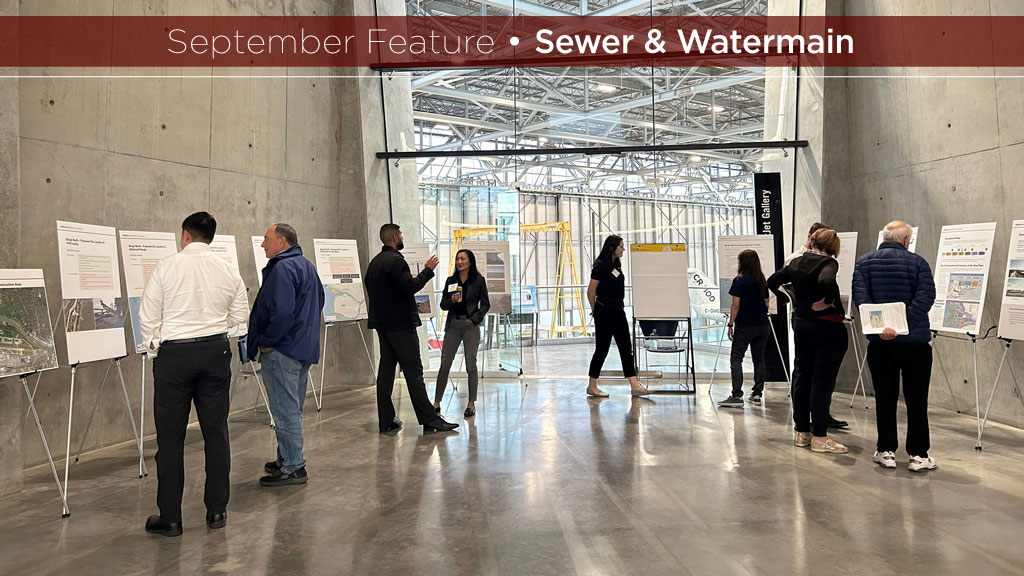Metro Vancouver has been investigating suitable locations for a barge berth that will be used as a staging area for the upgrade of the Iona Island Wastewater Treatment Plant.
The plant is located in the Fraser River estuary between Vancouver and Richmond.
Part of the process has involved Metro soliciting feedback from the residents who would be affected by the construction and use of the barge berth.
On Sept. 24, approximately 15 people attended an open house in Richmond to learn about a proposed site at an existing barge facility located on the eastern point of Sea Island.
The session was open to the public and primarily intended for neighbouring Sea Island residents to learn more.
The format was informal, with informational display boards and staff, including Winnie Shi, director of project delivery for Iona Wastewater Treatment Projects, on hand to answer questions.
The Sea Island site is the fourth barge berth location that Metro has proposed.
Metro had already put forward three other locations: northwest of Iona Island; adjacent to the construction laydown area; and McDonald Slough.
They were all roundly criticized by the people who live nearby.
While sites one to three are located on Iona Island itself, the fourth is approximately seven kilometres away, on Sea Island.
It is connected to Sea Island Way and eventually meets up with Ferguson Road.
The barge berth, wherever it is located, is expected to be in peak operation between 2026 and 2030.
When design and construction take place will depend on which site is selected.
An average of one barge per day will be pulled by tug to the berth.
Metro says the Iona Island Wastewater Treatment Plant is being upgraded “to ensure continued protection of public health and the environment in a growing region.”
The consulting engineering services contract for the upgrade has been awarded to Fraser Delta Group, a fully integrated joint venture between AECOM Canada Ltd. and Jacobs Consultancy Canada Inc.
The consortium has retained four sub-consultants: WSP Canada will provide geotechnical and environmental services; Local Practice, with sub-consultants Space2Place and Miller Hull, will provide building and landscape architectural services; Kerr Wood Leidal will provide resource recovery design services; and SenezCo will provide building code specialty services.
The cost of the upgrades to the aging wastewater treatment plant are expected to eventually exceed $10 billion, because it is one of the last in the region to require a minimum of secondary treatment to meet federal Wastewater Systems Effluent Regulations.
Built in 1963, the plant serves approximately 750,000 residents of the Vancouver Sewerage Area, which includes Vancouver, parts of the suburbs of Burnaby and Richmond, the University of British Columbia (UBC) and the University Endowment Lands, which are adjacent to UBC. That number is expected to grow to 950,000 by 2051.
The facility processes about 200 billion litres of wastewater every year, which is 40 per cent of the region’s total amount.
The upgraded plant is being designed to provide tertiary wastewater treatment to improve the treated wastewater quality that is discharged into the Pacific Ocean.
To go with the plant upgrade, complementary ecological projects will restore the ecosystem of Iona Beach Regional Park, build climate resilience and enable park visitors to enjoy nature.
The upgrade project is just getting started and is in the preliminary design stage, with early work to prepare the site underway.
To support the barge berth (whichever one is chosen), Ferguson Road in Richmond is being upgraded.
In partnership with the Vancouver Airport Authority, Ferguson Road will be re-aligned and a new water supply to the treatment plant will be built.
“The Ferguson Road upgrade will improve access for construction traffic and improves safety for cyclists and visitors to Iona Beach Regional Park,” says Shi.
Work on the upgrade has just been completed this month.
In addition, improvements to the Causeway Road are in the detailed design stage now, says Shi.
Upgrades will include widening the causeway to accommodate construction traffic, creating safer cycling shoulders northbound and southbound, creating queuing lanes for construction vehicles and upgrading utilities required for the new treatment plant.
“We hope to be in construction in early 2025,” says Shi.
The second barge berth open house will take place Oct. 8 from 6 to 8 p.m. at Dunbar Community Centre, 4747 Dunbar St., Vancouver.
Interested parties can complete a questionnaire by Oct. 15.

